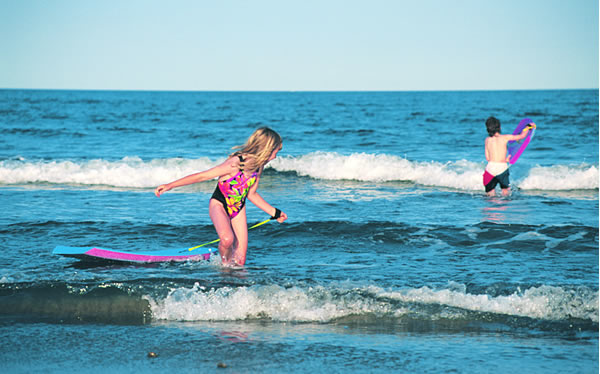Home → Water Quality → Healthy Beaches → Resources and Advice
Resources and Advice


Maine has beautiful beaches for the public to enjoy. Building public awareness about healthy beach habits will help ensure our beaches remain a natural resource we can all enjoy.
Staying Safe at the Beach

- Do not swallow untreated, non-potable water while at a beach.
- Do not swim when a beach advisory is posted.
- Avoid water contact after heavy rainfall.
In general, open ocean waters in Maine are considered clean and safe for swimming, however the MHB program, nor anyone else, can ever guarantee that waters are safe for swimming. The coastal zone is a dynamic system, and much can change during a short amount of time. The MHB program generally recommends that people opt for swimming in areas of the ocean that are well circulated. Locations with slow moving and warm freshwater inputs are generally higher in bacteria than those without them. This does not necessarily mean that the water is "contaminated", but natural wetland and shallow water habitats lend themselves to higher bacteria environments as they are good habitats for animal life, there isn't a lot of water turnover, and they make a nice environment for bacteria to live in. This sometimes means these locations are not ideal for swimming.
Additionally, MHB recommends avoiding water contact after a heavy rainfall. Stormwater runoff can negatively impact recreational water quality. When rain falls on the land, the water washes over the surface picking up bacterial pollutants from malfunctioning septic systems, wildlife, pet waste, etc. and is transported to the coastal surf-zone by runoff directly to the beach or via freshwater inputs such as rivers, streams and storm drains. Each beach differs in its susceptibility to elevated bacteria concentrations following moderate to heavy rainfall as circulation and dilution play a critical role in water quality conditions. MHB recommends waiting at least 24 hours or two full tidal cycles after the rainfall ceases before reentering the water to allow the system to flush.
Keeping Beaches Clean

- Do not swim if you are experiencing diarrhea.
- Shower before swimming and wash your hands after using the toilet or changing diapers.
- Properly dispose of pet waste and/or livestock manure.
- Maintain and routinely pump out your septic system.
- Report any illicit or questionable discharges to your Local Plumbing Inspector.
- Maintain appropriate vegetative buffers along waterways.
Keeping Kids Clean

- Take your children for frequent bathroom breaks.
- Use "swim diapers" with absorbent padding.
- Change diapers frequently, away from the water's edge and, if possible, in a bathroom.
- Dispose of diapers properly. Place them in trash receptacles or seal them in a plastic bag to carry out with you.
- Wash or sanitize your kid's hands when they've been in the bathroom.
Beach-Loving Pets and Wildlife

- Carry out pet waste or place it in the trash. Keep an empty plastic bag tied to your dog's leash so you're always prepared.
- Check and obey dog rules posted at your favorite beach or water-side park.
- Do not feed birds or wildlife on or near the beach. Feeding can be harmful to waterfowl and water quality.
- Trash may attract waterfowl and other animals. Carry out all trash or dispose of it properly.
Boating Basics

- Download the Maine Healthy Beaches Boater's Education Brochure
- Use Your Head! Never discharge untreated sewage directly into the water.
- Dispose of boat sewage properly. Know the location of pump-out stations. See Maine Boat Pumpouts and No Discharge Areas Interactive Map.
- Make certain you know the laws. It is illegal to discharge raw sewage within 3 miles of the coast. All boats with an installed toilet must have a properly functioning Marine Sanitation Device (MSD). It is illegal to discharge any sewage (treated or untreated) in a No Discharge Zone designation.
- If you know of any violations, report them to the local harbormaster.
Program Documents
- EPA Grant Report (pdf)
- Risk Assessment Matrix (pdf)
- Program Brochure (pdf)
- Boating Brochure (pdf)
- MHB Program Advisory Fact Sheet (pdf)
- MHB Program Quick Facts (pdf)
- MHB Poster (pdf)
- Think Healthy Swim Healthy Act Healthy Poster (pdf)
Freshwater Beach Information
Please see DEP's recommendations for monitoring at freshwater beaches.
Links
For additional information on healthy beaches, water quality and pollution prevention, link to these helpful sites:
U.S. Environmental Protection Agency
- US EPA Beaches Information, including National Beach Guidance and Performance Criteria for Recreational Waters (EPA-823-B-02-004)
- Nonpoint Source Pollution
- BEACH ACT
Centers for Disease Control and Prevention (CDC)